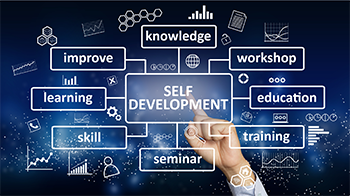 You are a work in progress, but are you working to improve yourself or stuck in self-criticism? Learn to constructively improve your life with self-coaching.
You are a work in progress, but are you working to improve yourself or stuck in self-criticism? Learn to constructively improve your life with self-coaching.
The benefits of coaching are obvious. We have all seen people improve thanks to the focused and personalized guidance of another person.
Athletes could not live up to their fullest potential without coaches. Parents coach their children in a million ways as they grow. Many businesspeople and other professionals turn to coaches to help them grow in their careers. Thanks to the help, support, and encouragement of a good coach, people often achieve more in life than they would without the coach's help.
It's likely that at some point in your life, you have been coached or mentored or that you have served as a coach or mentor to someone else. [quotesright]Surely, you saw the advantages of this sort of relationship and in most cases, the positive results that followed. [/quotesright]
However, despite our familiarity with and appreciation of coaching, we never think about self-coaching. If we have been coached, or if we have coached others, we already understand what coaching entails, and we already have the tools to coach ourselves. There's no reason why we can't.
Why Self-Coach?
Self-coaching makes sense, and it's genuinely surprising that we all haven't been doing it all along.
You'd make an excellent coach for yourself – the absolute best one, in fact. You are your own biggest fan and cheerleader, and no one wants you to succeed more than you do. [quotes]We care about our own success more than anyone else does.[/quotes] Sure, we all have people who support us as we move through this life, but when it comes down to it, our success is most important to ourselves.
On the other hand, we are not only our own biggest fans, but we are also our biggest critics and our own worst enemies. No one can criticize ourselves as personally and effectively as we can. We know all of our faults and weaknesses better than anyone else. Often, we use this sort of criticism to tear ourselves down.
It doesn't have to be that way.
It is possible to view oneself in a critical way and yet see those criticisms as constructive. Self-observation and self-evaluation are powerful tools. When used for good, they can change your life for the better.
Self-coaching can help us meet and achieve our goals, can help us build self-confidence and self-esteem, and can help us become more invested in our success in our work, in our personal lives, and in our relationships. Using internal constructive criticism combined with other positive actions will help you become the person you were always meant to be.
How to Be an Effective Self Coach
When it comes to self-coaching, there are no absolutes. Every person is a little different and therefore, everyone's personal, self-coaching process will be a bit different also.
However, the following tips and strategies offer a framework for starting to coach yourself. Use what works for you and toss away what does not. The most important part is that the coaching is effective for your personality. Otherwise, you'll just be treading water. Most of the following strategies work for most people, however, and the more you incorporate into your own coaching plan, the better.
Self-Evaluate
When embarking on the journey of self-coaching, the first thing you should do is sit down and take a long, hard look at yourself. Think about who you are now and who you would like to be. Are you ready, willing, and able to change? If the answers to any of those three questions are no, you may not be ready to move forward quite yet. In that case, ask yourself what it will take to get there.
If you are ready to make some life changes, then take time to imagine your future self and to think about potential goals. How much time do you have to commit to them? How soon can you realistically reach them?
Figure Out Your Weaknesses
You should also take some time to consider and catalog your weaknesses in the early stages of the self-coaching process. What are your fears and what obstacles might you face along the way? [quotesright]What kinds of things have impeded your progress in the past? [/quotesright]
Everyone has weaknesses so don't beat yourself up about what you discover here. Whether you battle procrastination, negative self-talk, indifference, or plain old laziness, these things can all be overcome. Once you have identified and named them, they will be easier to attack. Look for resources such as books or blogs to help you work through them as they arise.
Practice Mindfulness
Mindfulness is a buzzword these days, but that's for good reason. Paying attention to your thoughts, feelings, emotions, challenges, and surroundings can make them easier to tame and understand. Taking time each day to meditate and later relax with your thoughts can help you in countless ways. Quieting the mind, embracing awareness, and stepping away from it all is a great strategy when trying to achieve big things.
Set Good Goals
[quotesright]One of the best things you can do for yourself is to learn how to properly set goals. [/quotesright] According to the concept of SMART goal setting, goals should be specific, measurable, achievable, relevant, and time-bound to be effective. If any of those five components are missing, you will likely struggle to reach the goals you set.
Don't set too many goals at first – doing so can be overwhelming. Pick a few things you would really like to achieve and follow the steps to do so. Then, you can set more goals from there.
Create a Plan
Once you have set some goals, you need to make a plan. Break your goals into manageable, achievable chunks. When you look at a big goal all by itself, it can seem overwhelming and impossible.
[quotes]Divide your big goal into smaller goals and work to reach them one at a time.[/quotes] Small celebrations as you go will help keep you on the path to the pot of gold at the end of the rainbow.
[sidebar]
Self-Coaching Not Working for You?
We get it. It’s not easy and sometimes just chatting about it with someone who understands will get you back on track. Get in touch and let's set up a time to talk. Brian Tracy USA: 877.433.6225 Email Me
[/sidebar]
Focus on Positive Thinking
One thing every great coach does is offer ongoing feedback. Some of that feedback is focused on things to be tweaked and improved, but much of it is positive reinforcement.
When you are coaching yourself, you must remember the importance of praising yourself and of rewarding yourself for a job well done. It's so easy to just put your head down and keep moving forward, but if that's all you do, you'll wear yourself out before you know it. Take breaks as needed; overworking will set you back, not move you ahead.
[quotesright]Stay positive even when the going gets tough. It's amazing what positive thinking and positive self-talk can do. [/quotesright]
Learn How to Motivate Yourself
Motivation is a powerful force when you are able to harness it, but often it seems just a little out of reach. The things that motivate each individual are different, so you need to figure out what works for you. Some people are best motivated by thinking about their past achievements. Others are motivated by thinking about their future or their loved ones. Figure out what makes you tick and use that to your advantage when self-coaching.
Keep Track of Your Progress
It's crucial that you keep track of your progress along the way. If someone else was coaching you, he or she would remind you of how far you have come as you continue to move forward; when self-coaching, this role is yours. One great way to do this is by journaling on a daily or weekly basis. [quotesright]When you feel like you have achieved little, take some time to look back at all you have accomplished thus far. [/quotesright]
Hold Yourself Accountable
Another important job of a coach in professional coaching, business coaching, life coaching, or sports coaching is accountability. Since no other person is present in this coaching relationship, holding yourself accountable is up to you.
Many people find this to be the most difficult part of self-coaching, but it's not impossible. At first, you may find it easy to skip out on your responsibilities because no one will know but you, but when you realize that the only person you're disappointing and cheating is yourself, you will likely begin to do what you said you would do time and time again.
Don't Beat Yourself Up
However, with that said, when you have an off day here and there or make a mistake or don't reach a goal in the time or way you planned, don't chastise yourself too much. A good coach would support you through thick and thin and everyone knows that we all make mistakes and even fail sometimes. Brush yourself off and get back to it.
Stick with It
Achieving your goals isn't easy and you'll often want to give up, but don't. Any coach – including you when coaching yourself – would encourage you to keep going even when the going gets tough. Giving yourself constant pep talks is important in self coaching and you may even need to do so on a daily or even hourly basis. [quotesright]Keep moving forward and keep your eye on the prize. [/quotesright]
Self-Coaching Will Take You to the Next Level
To be successful as your own coach, you'll need to work hard and stay focused, but once you get the hang of it, the sky's the limit. You'll be amazed at the ways that self-coaching can transform your life and help you to be successful in many different realms. Follow the above tips and strategies to get started, and you'll be amazed at how far you can go.














